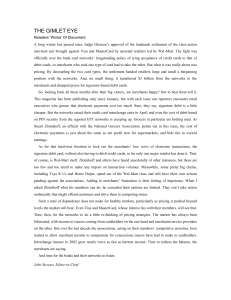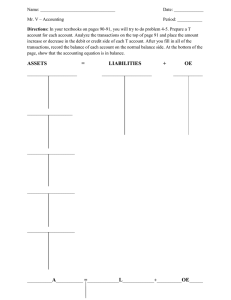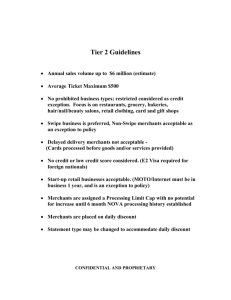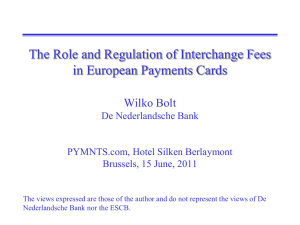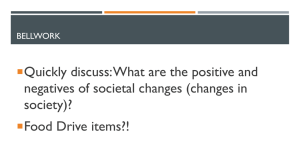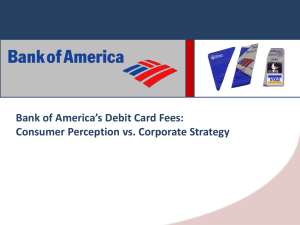Consequences of the Mandated Decrease of
advertisement
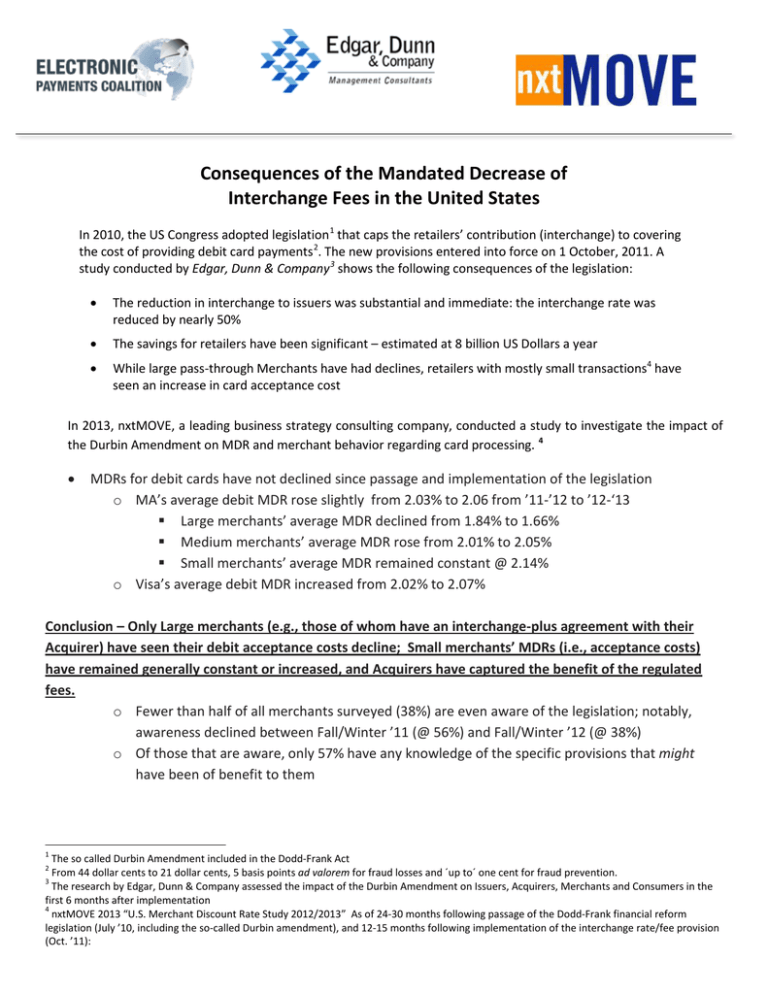
Consequences of the Mandated Decrease of Interchange Fees in the United States In 2010, the US Congress adopted legislation 1 that caps the retailers’ contribution (interchange) to covering the cost of providing debit card payments 2. The new provisions entered into force on 1 October, 2011. A study conducted by Edgar, Dunn & Company 3 shows the following consequences of the legislation: • The reduction in interchange to issuers was substantial and immediate: the interchange rate was reduced by nearly 50% • The savings for retailers have been significant – estimated at 8 billion US Dollars a year • While large pass-through Merchants have had declines, retailers with mostly small transactions4 have seen an increase in card acceptance cost In 2013, nxtMOVE, a leading business strategy consulting company, conducted a study to investigate the impact of the Durbin Amendment on MDR and merchant behavior regarding card processing. 4 • MDRs for debit cards have not declined since passage and implementation of the legislation o MA’s average debit MDR rose slightly from 2.03% to 2.06 from ’11-’12 to ’12-‘13 Large merchants’ average MDR declined from 1.84% to 1.66% Medium merchants’ average MDR rose from 2.01% to 2.05% Small merchants’ average MDR remained constant @ 2.14% o Visa’s average debit MDR increased from 2.02% to 2.07% Conclusion – Only Large merchants (e.g., those of whom have an interchange-plus agreement with their Acquirer) have seen their debit acceptance costs decline; Small merchants’ MDRs (i.e., acceptance costs) have remained generally constant or increased, and Acquirers have captured the benefit of the regulated fees. o Fewer than half of all merchants surveyed (38%) are even aware of the legislation; notably, awareness declined between Fall/Winter ’11 (@ 56%) and Fall/Winter ’12 (@ 38%) o Of those that are aware, only 57% have any knowledge of the specific provisions that might have been of benefit to them 1 The so called Durbin Amendment included in the Dodd-Frank Act From 44 dollar cents to 21 dollar cents, 5 basis points ad valorem for fraud losses and ´up to´ one cent for fraud prevention. 3 The research by Edgar, Dunn & Company assessed the impact of the Durbin Amendment on Issuers, Acquirers, Merchants and Consumers in the first 6 months after implementation 4 nxtMOVE 2013 “U.S. Merchant Discount Rate Study 2012/2013” As of 24-30 months following passage of the Dodd-Frank financial reform legislation (July ’10, including the so-called Durbin amendment), and 12-15 months following implementation of the interchange rate/fee provision (Oct. ’11): 2 o Among Small merchants: Approximately two-thirds (70%) remain unaware of the legislation Of those that are aware, less than half (43%) have any knowledge of specific provisions o Among Large merchants: Not surprisingly, awareness of the legislation is high (59%) Of those that are aware, knowledge of specific provisions is also high (79%) Conclusion – Merchants’ awareness of the legislation is generally low except among Large merchants, indicating that most merchants have not sought or seen any benefits theoretically available to them. • To the extent merchants are aware of the opportunity for cost savings or have experienced any cost savings, only 3% expressed intent to pass cost savings on to consumers Conclusion – Consumers have not benefitted from lower prices (or any other comparable benefit) theoretically available had merchants benefitted from the interchange rate reductions. A study conducted by the Electronic Payment Coalition 5 of the consequences of the new legislation shows the following results: • Customers paid an average of 1.5 percent more for the same products at retailers’ after the new rules entered into force 5 • Consumers are paying higher prices for traditional banking services as financial institutions seek to replace the 8 billion US Dollar annual shortfall • Fees have now been introduced for services that were previously provided for free or at a very low cost. For instance free banking with no minimum balance is less readily available (39% of banks, compared to 76% before the legislation6). Many payment accounts for cardholders have transitioned from either no-fee or a very low monthly maintenance fee to more significant monthly fees in the range of 10-13 US Dollars • Furthermore, consumers are seeing card rewards programmes being dramatically cut Electronic Payment Coalition Field Research of 18 retail locations. Media Reports on Merchant Actions Post Durbin Enactment • Across the board, Home Depot raised its prices the most—with a 4.84% cumulative increase across the five cities sampled. Walmart raised its prices by 1.43% while 7-­‐Eleven increased consumer costs by 0.59%. The lone example of a price decrease occurred at Walgreens stores. Walgreens customers saw their prices drop by 2.4% on average. http://wheresmydebitdiscount.com/wpcontent/themes/epc/media/Durbin%20White%20Paper_092812_small.pdf • Though gas stations are being charged less by debit card companies thanks to the Durbin Amendment in the Dodd-Frank Act, gas stations are failing to pass on the more than $1 billion in savings to customers, according to a recent survey by the Electronic Payments Coalition. http://www.huffingtonpost.com/2012/04/24/long-island-gas-stations-credit-card-fee_n_1449182.html • Feel like you're getting gouged at the gas pump amid rising prices? You actually are if you're using a debit card. Despite the passage of the Durbin Amendment to the Dodd-Frank legislation last year, gas stations have yet to pass along more than $1 billion in debit card transaction fee savings to consumers, according to a survey released Monday by the Electronic Payments Coalition. http://www.dailyfinance.com/2012/04/17/gas-stations-are-hosing-debit-card-users-at-thepump/?utm_medium=referral&utm_source=pulsenews\ • Park Mobile USA Inc., the company in charge of D.C.’s mobile parking, sent out an email to customers explaining the fare increase thusly: “Beginning October 29th, transaction fees in DC will increase from $0.32 to $0.45 due to increased costs triggered by recent federal legislative reform enacted by the Dodd-Frank Wall Street Reform and Consumer Protection Act’s Durbin Amendment,” the company explained. http://hoh.rollcall.com/dickdurbin-blamed-for-new-parking-tax/ • Home Depot earnings call from (February 2011) which describes the expected result for the retailer from the Fed rule. "On the Durbin side, as you know the Durbin amendment asks the Federal Reserve to determine what reasonable and proportionate fees should be for debit. Debit makes up about 17% of our tender penetration. Based on the Fed's draft regulations, we think the benefit to The Home Depot could be $35 million a year." (Full transcript from call is here. http://seekingalpha.com/article/254224-the-homedepot-s-ceo-discusses-q4-2010-results-earnings-call-transcript)
